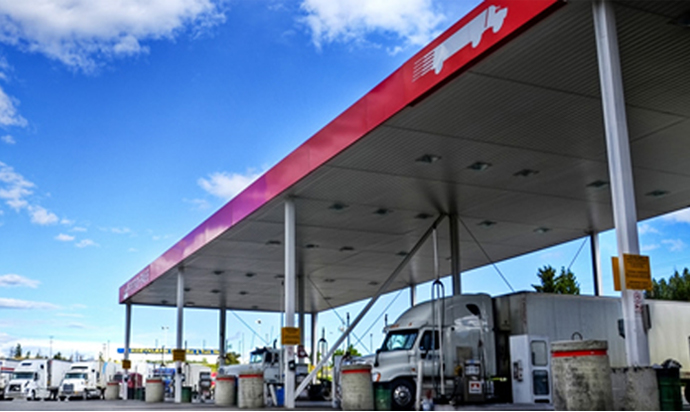It is particularly challenging to make predictions in uncertain times, but it remains essential to challenge the best minds to do so. Canadian Fuels Association is pleased to play a role in all discussions related to a low carbon future. David Schick, our Vice President – Western Canada, recently moderated an online panel that brought together experts with perspectives on the future of low carbon, long-haul transport.
Crystal Ball Gazing: How do we decarbonize long distance transport during/after COVID-19? was organized by the BC-SMART Biofuels Consortium and IEA Bioenergy Task 39—two organizations with stakes in the future of sustainable long-distance transport. Panelists included Chantale Despres, Director – Sustainability, Canadian National Railway; Peter Lister, Vice President – Commercial Services, Seaspan; Chris Vervaet, Executive Director of the Canadian Oilseed Processors Association; and Geoffrey Tauvette, an expert in low carbon and sustainable aviation from WestJet.
Our collective journey to a low carbon future began well before COVID-19. But the pandemic has complicated the path forward with impacts that reverberate across industry and society as a whole.
Long distance transport is the economy’s circulation system in Canada, North America and around the world. It has proven its value during the pandemic. Medical supplies, food, energy and other vital goods continued to flow despite unprecedented shutdowns. Now, industry priorities are shifting to balance post-pandemic operational challenges with the need for capital spending on carbon-reduction strategies.
Challenged to stay the course
Five overarching themes emerged from the event:
- Long distance transport will remain a key enabler in a lower carbon economy.
- New technologies and strategies will change the way people and goods are transported in the future.
- Alternative fuels will continue to increase in market share and will be increasingly popular for use in specific applications
- Liquid fuels with lower carbon content will continue to play an important role in fuelling long distance, commercial transport operations due to their high energy density and cost competitiveness.
- The global pandemic has disrupted industry’s timeline for investments in lower carbon initiatives, and has created uncertainty around demand.
Here are some high-level insights from the panel:
Sustained flight
In aviation, operators are in survival mode due to sector losses of nearly $85 billion during the pandemic. Growth is expected to return to normal eventually, but questions remain about the degree to which environmental sustainability will stay a key component of aviation’s growth strategy. Reduced revenue means lower innovation investments, although some airline bailouts are tied to environmental conditions. While sustainable aviation fuels may offer the best medium-term solution, the industry believes that current government sustainable fuel policies favour ground transportation and thereby limit supply for aviation.
Staying on track
CN’s use of renewable fuels—mainly biodiesel blends—has saved almost 100,000 tonnes of carbon since 2018. The company’s low carbon transition plan has CN on track to mitigate climate risks and seize opportunities. Carbon-positive initiatives are key; specifically, fuel-efficient locomotives using cleaner fuels, new rail technologies and data analytics. Looking forward, CN is collaborating with Lion Electric to develop a Class 8 zero-emission electric truck primarily for short-haul applications. The company is also examining the prospects for electrification and the use of hydrogen power in trains.
Making waves
COVID-19 has precipitated shipping-traffic increases at some ports but a slight reduction overall for Seaspan. The company operates Canada’s largest fleet of tugs and ferries. It’s doing its part to meet International Maritime Organization target of a 50% reduction in GHG emissions in global shipping compared to 2008 levels. Two LNG-powered Seaspan ferries have been in operation since 2017. Plans for the acquisition of two more are still in the works. On the trucking side, Seaspan—like most experts—sees little opportunity for electrification in long-haul applications due to technical limitations. The company considers low carbon fuels to be the best option to achieve emissions targets.
Growing from seed
Canada’s oilseed processors agree. Canola, for example, has a low carbon intensity that makes it an ideal blending feedstock in liquid fuel production. Canola-based biofuels already reduce GHG emissions in Canada by 1.4 million tonnes of CO2 equivalent each year. The oilseed industry believes regulations such as the federal Clean Fuel Standard have the potential to create a domestic market isolated from global uncertainty.
Coming together for the long haul
At Canadian Fuels, we believe a strong economy and achieving Canada’s environmental goals will demand the contributions of all those tasked with moving people and goods over long distances.
The Crystal Ball Gazing event drew more than 100 attendees, including stakeholders from Europe. Events like this facilitate important conversations and highlight differing viewpoints—all valuable to find common ground and plug us in to the ingenuity and power of cross-sector collaboration that will spark solutions post-COVID-19.

